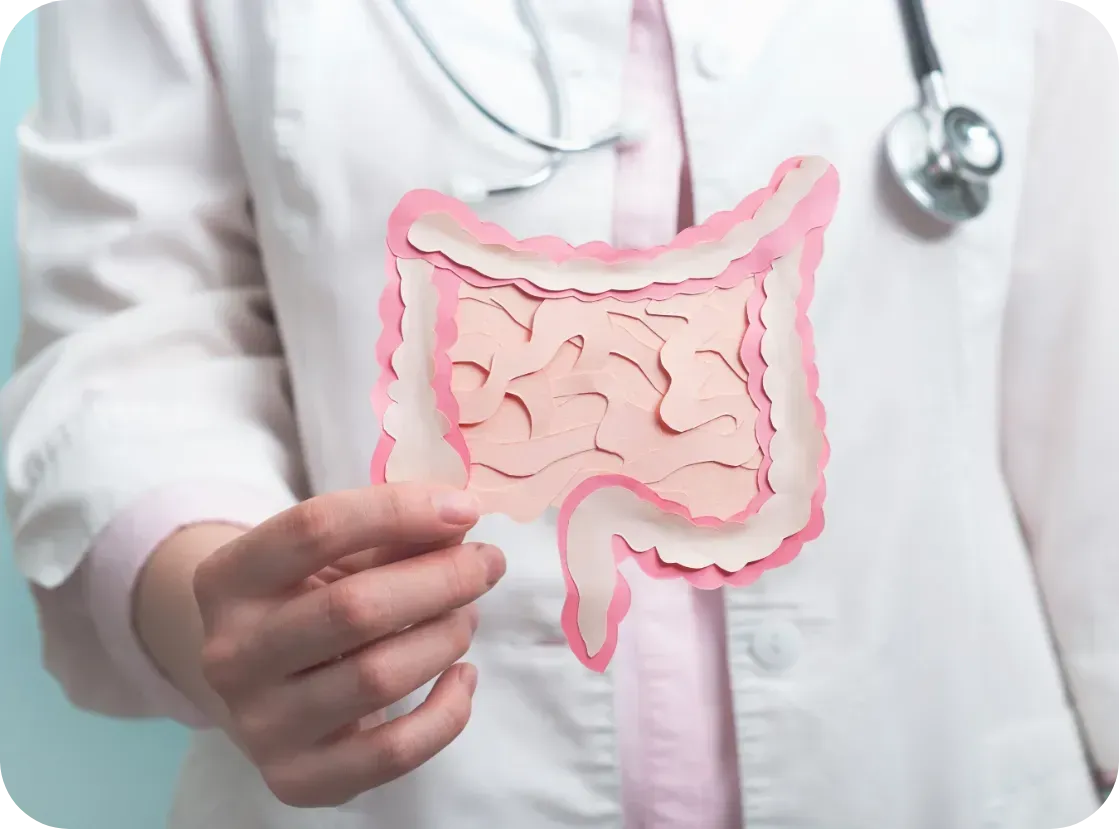GUT FEELINGS: The Hidden Link Between Gut Health and Hormonal Imbalance
By Our Daughters Foundation
GUT FEELINGS: The Hidden Link Between Gut Health and Hormonal Imbalance
By Our Daughters Foundation
1. The Gut Microbiome: Your Internal Ecosystem
Your gut isn’t just a tube for digesting food. It’s home to trillions of bacteria that:
• Help break down food
• Make key nutrients (like B vitamins)
• Train your immune system
• And — importantly — regulate estrogen levels
This bacterial community is called the gut microbiome, and when it’s healthy and diverse, it supports balanced hormones. But when the microbiome is out of balance — a condition called dysbiosis — problems can arise.

2. Estrobolome: The Gut’s Hormone Filte
Inside the gut, a specific group of bacteria known as the estrobolome helps process estrogen. These bacteria produce enzymes (like beta-glucuronidase) that influence how much estrogen is reabsorbed into the bloodstream versus excreted.
When the estrobolome is overactive or underactive, it can lead to:
• Excess circulating estrogen → linked to endometriosis, fibroids, PMS, and breast tendernes
• Too little estrogen → contributing to mood changes, bone loss, and vaginal dryness
So a disrupted gut can directly amplify hormonal imbalances.
3. Inflammation: The Common Denominator
Both gut dysbiosis and endometriosis are associated with chronic inflammation. When the gut barrier is weakened (a condition sometimes called “leaky gut”), it allows inflammatory molecules to pass into the bloodstream. This triggers an immune response — and in people with endometriosis or PCOS, it can worsen pelvic pain, fatigue, and hormonal chaos.

4. What the Research Says
While this field is still developing, early studies have found:
• Women with endometriosis often have altered gut microbiomes compared to those without the condition. [Study: Ata et al., 2019, Scientific Reports]
• A high-fiber, plant-rich diet may help support a more balanced gut flora and improve estrogen metabolism. [Study: Fuhrman et al., 2004, Journal of Nutrition]
• Some researchers are exploring probiotic therapy as a future tool for managing hormone-related conditions.
5. What Can You Do?
You can’t fully control your hormones — but you can support your gut.
Here are some gut-friendly, hormone-supporting habits:
• Eat more fiber: vegetables, fruits, legumes, and seeds
• Avoid excessive sugar and processed foods
• Include fermented foods: yogurt, kefir, sauerkraut, kimchi
• Consider a probiotic — talk to your provider first
• Manage stress — cortisol (the stress hormone) also affects gut balance
• Support liver detoxification (which works with your gut to clear estrogen): eat cruciferous vegetables like broccoli and cauliflower

Final Thoughts
The gut isn’t just about digestion — it’s a key player in how your body handles hormones, pain, and inflammation.
If you’re struggling with endometriosis, PCOS, or unexplained hormone symptoms, supporting your gut might be an empowering place to start.
Want to Learn More?
Here are some helpful articles and research:
• The Gut Microbiome and Estrogen Metabolism – NIH
https://www.ncbi.nlm.nih.gov/pmc/articles/PMC6471213/
• Gut Microbiota and Endometriosis – Scientific Reports
https://www.nature.com/articles/s41598-019-39645-2
• How the Gut Influences Hormones – Integrative Medicine Journal
1. The Gut Microbiome: Your Internal Ecosystem
Your gut isn’t just a tube for digesting food. It’s home to trillions of bacteria that:
• Help break down food
• Make key nutrients (like B vitamins)
• Train your immune system
• And — importantly — regulate estrogen levels
This bacterial community is called the gut microbiome, and when it’s healthy and diverse, it supports balanced hormones. But when the microbiome is out of balance — a condition called dysbiosis — problems can arise.

2. Estrobolome: The Gut’s Hormone Filte
Inside the gut, a specific group of bacteria known as the estrobolome helps process estrogen. These bacteria produce enzymes (like beta-glucuronidase) that influence how much estrogen is reabsorbed into the bloodstream versus excreted.
When the estrobolome is overactive or underactive, it can lead to:
• Excess circulating estrogen → linked to endometriosis, fibroids, PMS, and breast tendernes
• Too little estrogen → contributing to mood changes, bone loss, and vaginal dryness
So a disrupted gut can directly amplify hormonal imbalances.
3. Inflammation: The Common Denominator
Both gut dysbiosis and endometriosis are associated with chronic inflammation. When the gut barrier is weakened (a condition sometimes called “leaky gut”), it allows inflammatory molecules to pass into the bloodstream. This triggers an immune response — and in people with endometriosis or PCOS, it can worsen pelvic pain, fatigue, and hormonal chaos.

4. What the Research Says
While this field is still developing, early studies have found:
• Women with endometriosis often have altered gut microbiomes compared to those without the condition. [Study: Ata et al., 2019, Scientific Reports]
• A high-fiber, plant-rich diet may help support a more balanced gut flora and improve estrogen metabolism. [Study: Fuhrman et al., 2004, Journal of Nutrition]
• Some researchers are exploring probiotic therapy as a future tool for managing hormone-related conditions.
5. What Can You Do?
You can’t fully control your hormones — but you can support your gut.
Here are some gut-friendly, hormone-supporting habits:
• Eat more fiber: vegetables, fruits, legumes, and seeds
• Avoid excessive sugar and processed foods
• Include fermented foods: yogurt, kefir, sauerkraut, kimchi
• Consider a probiotic — talk to your provider first
• Manage stress — cortisol (the stress hormone) also affects gut balance
• Support liver detoxification (which works with your gut to clear estrogen): eat cruciferous vegetables like broccoli and cauliflower

Final Thoughts
The gut isn’t just about digestion — it’s a key player in how your body handles hormones, pain, and inflammation.
If you’re struggling with endometriosis, PCOS, or unexplained hormone symptoms, supporting your gut might be an empowering place to start.
Want to Learn More?
Here are some helpful articles and research:
• The Gut Microbiome and Estrogen Metabolism – NIH
https://www.ncbi.nlm.nih.gov/pmc/articles/PMC6471213/
• Gut Microbiota and Endometriosis – Scientific Reports
https://www.nature.com/articles/s41598-019-39645-2
• How the Gut Influences Hormones – Integrative Medicine Journal
Join Us: Make a Difference Today
Your support can transform lives. Every donation helps us fund research, advocate for better care, and provide essential grants to women facing debilitating conditions.
Join Us: Make a Difference Today
Your support can transform lives. Every donation helps us fund research, advocate for better care, and provide essential grants to women facing debilitating conditions.




